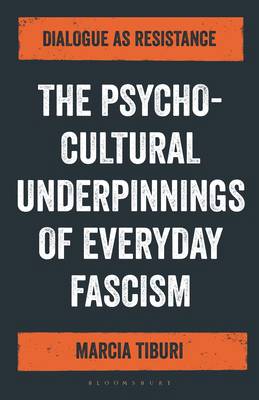
- Retrait gratuit dans votre magasin Club
- 7.000.000 titres dans notre catalogue
- Payer en toute sécurité
- Toujours un magasin près de chez vous
- Retrait gratuit dans votre magasin Club
- 7.000.0000 titres dans notre catalogue
- Payer en toute sécurité
- Toujours un magasin près de chez vous
Psycho-Cultural Underpinnings of Everyday Fascism
Dialogue as Resistance
Marcia Tiburi
Livre relié | Anglais
115,45 €
+ 230 points
Description
When the Brazilian public intellectual Marcia Tiburi published The Psycho-Cultural Underpinnings of Everyday Fascism in 2015, fascism was yet to return to the public consciousness. But Tiburi was motivated by the kind of fascism she was noticing in daily life - people who fail to practise any kind of reflection about society, betraying a pattern of everyday thought characterized by the repetition of clichés and the angry language of hatred. Three years later, Brazil elected the far-right President Jair Bolsonaro.
Now available in English for the first time, this prescient work speaks to our present moment. Fascism is among us once again, evident in the collective expression of exacerbated authoritarianism and the growing hatred against difference and people marked as socially undesirable. Drawing on her own first-hand, brutal encounters, Tiburi connects ways of thinking in Brazil to what is happening around us today and introduces us to the fascist as manipulator, the distorter of other people's speech; fascist as an activist of evil on a daily basis, the one who lives by fostering racism and male-domination and is proud of it.
Tiburi takes us beyond formal policies, reinvigorates ideas from the Frankfurt School and refuses to otherize supporters of fascism. Instead she asks what is amiss in their lives that then attracts them to a political project that victimizes them. This powerful book forces us to consider to our actions at a subjective level and changes our way of thinking through issues of hate and divisiveness pervading politics everywhere.
Now available in English for the first time, this prescient work speaks to our present moment. Fascism is among us once again, evident in the collective expression of exacerbated authoritarianism and the growing hatred against difference and people marked as socially undesirable. Drawing on her own first-hand, brutal encounters, Tiburi connects ways of thinking in Brazil to what is happening around us today and introduces us to the fascist as manipulator, the distorter of other people's speech; fascist as an activist of evil on a daily basis, the one who lives by fostering racism and male-domination and is proud of it.
Tiburi takes us beyond formal policies, reinvigorates ideas from the Frankfurt School and refuses to otherize supporters of fascism. Instead she asks what is amiss in their lives that then attracts them to a political project that victimizes them. This powerful book forces us to consider to our actions at a subjective level and changes our way of thinking through issues of hate and divisiveness pervading politics everywhere.
Spécifications
Parties prenantes
- Auteur(s) :
- Editeur:
Contenu
- Nombre de pages :
- 216
- Langue:
- Anglais
Caractéristiques
- EAN:
- 9781350165366
- Date de parution :
- 18-11-21
- Format:
- Livre relié
- Format numérique:
- Genaaid
- Dimensions :
- 140 mm x 216 mm
- Poids :
- 394 g

Les avis
Nous publions uniquement les avis qui respectent les conditions requises. Consultez nos conditions pour les avis.






